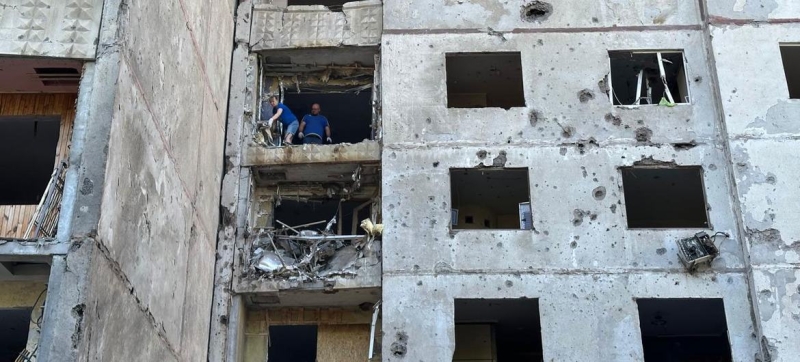
Aftermath of strikes in Kharkiv, September 2024. Ukraine: attacks on power grid threaten health care and nuclear safety Peace and security
Russia’s massive strikes on Ukraine’s energy infrastructure this week are heightening concerns about the plight of civilians ahead of winter, Jeremy Lawrence, spokesman for the UN High Commissioner for Human Rights, said at a briefing in Geneva.
Missile strikes and drone attacks on Thursday reportedly led to power outages in at least 13 regions of Ukraine, as well as in Kyiv.
Basic Services Outages
Lawrence said that in some areas, there were disruptions to transport, water and other basic services. As always, the most vulnerable groups – the elderly, low-income households, people with disabilities and internally displaced persons – are most at risk, the UN Human Rights Office (OHCHR) representative said.
“The High Commissioner recalls that the multiple aspects of the military campaign to damage or destroy Ukraine’s civilian energy infrastructure, including facilities vital to the survival of civilians, such as heating systems during the winter, raise serious concerns regarding the Russian military’s compliance with key principles of international humanitarian law, such as distinction, precaution and proportionality in the conduct of hostilities,” Lawrence said. OHCHR reiterated its call on the Russian Federation to immediately cease all attacks on Ukraine’s energy infrastructure, as well as to investigate these attacks and hold accountable all those responsible for serious violations.
Healthcare system
In turn, World Health Organization (WHO) representative Jarno Habicht emphasized that more than 1,000 days of full-scale invasion have jeopardized public health in Ukraine and put enormous pressure on the country’s medical system. During this time, the burden of diseases has increased significantly, including mental disorders, chronic and infectious diseases. With winter approaching, special attention is being paid to protecting energy infrastructure, which is critical for the functioning of hospitals, primary health care facilities and pharmacies.
Read also:
WHO warns of shortage of health workers in Ukraine
Habicht also noted that to date, WHO has recorded 2,159 attacks on the Ukrainian healthcare system. At the same time, according to him, the number of casualties among health workers and other civilians in such attacks has increased significantly in 2024.
Nuclear safety
Meanwhile, International Atomic Energy Agency (IAEA) Director General Rafael Mariano Grossi said on Friday that Ukraine’s three operating nuclear power plants had reduced their output this morning after renewed attacks on the country’s energy infrastructure, further threatening nuclear safety.
For the second time in less than two weeks, the Khmelnytskyi, Rivne and South Ukraine nuclear power plants reduced capacity as a precaution during major military action, while air raid sirens were sounded at three sites, Grossi said. Two IAEA expert teams at the Ukrainian sites were forced to take shelter in shelters.
“Ukraine’s energy infrastructure is extremely fragile and vulnerable, which puts nuclear safety at risk,” Grossi said. “I once again call for maximum restraint when conducting military action in areas with major nuclear power facilities and other important infrastructure.”
There were no reports of direct damage to the nuclear power plants, but Ukraine informed the IAEA that strikes had again hit electrical substations, which are used for both transmitting and receiving electricity. In September and October, IAEA teams visited seven substations to assess the situation after the August strikes and found “significant damage,” concluding that “the grid’s ability to provide reliable off-site power to Ukraine’s nuclear power plants has been significantly reduced,” the IAEA chief said last week.
“The IAEA will continue to assess the extent of the damage to facilities and transmission lines that are critical to nuclear safety and security,” he said today.
